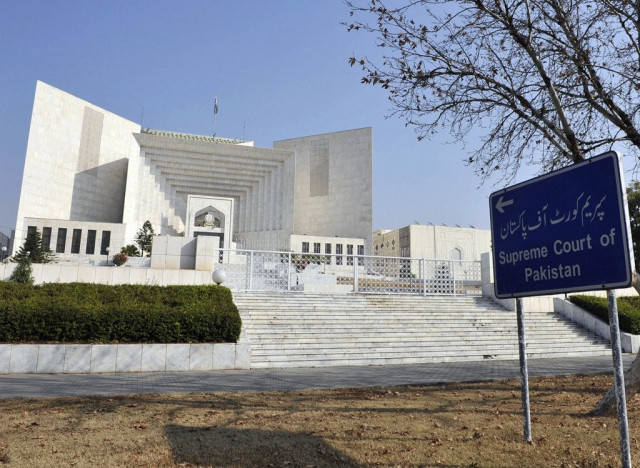Lawyer says SC can’t decide election disputes
SC judge notes court exercises public interest jurisdiction for enforcing fundamental rights

Supreme Court of Pakistan. PHOTO: AFP/FILE
Former law minister Iftikhar Gilani – counsel for Habibullah – on Tuesday also contended before a two-judge SC bench, headed by Justice Sheikh Azmat Saeed, that the Election Commission of Pakistan’s (ECP) decisions cannot be challenged directly in the apex court.
Hindu panchayat bars women from contesting elections
The counsel said adjudication of election disputed under Article 184 (3) is inappropriate because other available forums are becoming ineffective. Likewise, litigants are also concerned over the exercise of suo motu jurisdiction to decide elections matters
However, Justice Saeed rejecting his objection and said the apex court exercises public interest jurisdiction under Article 184 (3) for enforcing fundamental rights. When there is a vacuum to redress anyone grievances then the apex court while exercising the same jurisdiction can give relief, he said.
He also pointed out that these are the lawyers who brought petition under Article 184 (3) of the Constitution. The judge also referred to Shehla Zia case, wherein petition was filed under Article 184 (3) of the Constitution.
Meanwhile, the bench suspended the ECP’s decision for recounting at 14 polling stations of PB-21Qila Abdulla. The bench decided to examine whether the commission can pass such order after 60 days of elections. Notice has also been issued to Attorney General for Pakistan to assist on this point.
Zamar Khan was declared returned candidate but his opponent challenged his victory in the ECP on the ground that there was misappropriation/irregularities in the counting of 14 polling station.
After 60 days of elections, the ECP ordered recounting but the petitioner approached the apex court challenging the commission authority. Now the apex court will determine the ECP’s authority to pass such order after 60 days of elections. Hearing of the case is adjourned till the first week of January.
Meanwhile, the Pakistan Bar Council (PBC) meeting is going to be held on Saturday to devise a joint strategy for regularising the SC’s power under Article 184 (3) of the Constitution. The apex court has also issued notice to the PBC to structure its suo motu powers.
According to agenda of the meeting, the PBC will consider a letter of its executive member Raheel Kamran Sheikh, who is urging the council to demand formation of full court to hear the matter.
Sheikh in his letter stated that it is surprising that the Chief Justice of Pakistan (CJP) Mian Saqib Nisar, who has expanded and thoroughly enjoyed the exercise of power under Article 184(3) of the Constitution during his tenure and expanded scope of that to unprecedented degrees, undertakes such an exercise on judicial side at this juncture when he is about to retire.
“Be that as it may, it is never too late to regulate such a power that carries with it the potential to distort, paralyse or even takeover other systems in the society. Be it judicialisation of politics or economics or art and culture, Bar must play its due role to safeguard against such unwarranted interventions.
“At the same time, while regulating exercise of one of the most important jurisdictions of the under Article 184, unnecessary restrictions that may make the Supreme Court toothless against other organs of the state and society in respect of blatant violations of the fundamental rights, oppressions and injustices, must be equally unacceptable,” he said.
The letter said given the importance and sensitivity of such an exercise, the bar should demand hearing of this case by the full court and in this regard the position to be taken in the court by this apex bar should be discussed and resolved before hand at the earliest.



















COMMENTS
Comments are moderated and generally will be posted if they are on-topic and not abusive.
For more information, please see our Comments FAQ